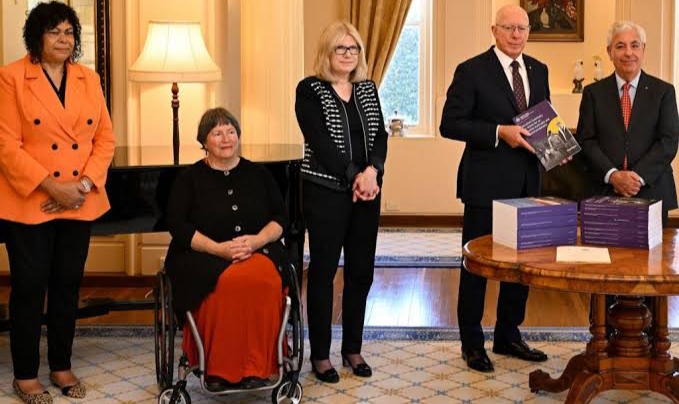According to a royal commission, Australia needs to undergo a societal change to become more inclusive and stop individuals with disabilities from continuing to be abused and subjected to violence.
Today, the $600 million, four-and-a-half-year Royal Commission into Violence, Abuse, Neglect, and Exploitation of People with Disabilities presented its final report to parliament, which included a whopping 222 recommendations aimed at the federal, state, and territorial governments as well as non-governmental organisations.
The federal government chose not to respond to those recommendations today, claiming that the size of the findings necessitates a lengthy response.
According to Social Services Minister Amanda Rishworth, “given the breadth and scope of the final report, the government will take a considered and staged approach in responding to the recommendations.”
“Therefore, we will not be providing a government response to any specific recommendations today, but as I’ve outlined, we have a process that will start today, wherein our government will carefully consider the final report and give it the attention it deserves.”
A taskforce will be created to coordinate the government’s response to the royal commission’s findings, and a progress report is due early in the following year.
One of the report’s main suggestions is to abolish segregated or special education by the year 2051, as well as all schools and classes that cater only to people with disabilities.
“Transformation requires phasing out and ending special/segregated education and ensuring inclusive educational systems,” the commissioners wrote.
“This is to prevent a lifetime of segregation for people with disabilities in the future generations.”
The establishment of disability employment targets, increasing the availability of accessible and adapted housing, and creating a law to defend the human rights of people with disabilities are also among the major recommendations.
The royal inquiry discovered there are numerous impediments for people with disabilities after hearing from 837 witnesses and collecting just under 8000 submissions.
According to the report, “our investigation has revealed people with disabilities continue to experience high rates of violence and abuse, numerous forms of neglect, and sexual and financial exploitation.”
Violence, abuse, neglect, and exploitation affect people at different times of their lives and in a variety of settings and contexts.People with disabilities are still prohibited from engaging in many aspects of life because of their impairment.
The 4872-page executive summary and 12 complete volumes make it abundantly obvious that for Australian society to enhance the lives of persons with disabilities, radical change is necessary.
The report claims that it is up to all of Australia to create an inclusive society.
“Witnesses at public hearings and others who interacted with us highlighted how important it is for all Australians to hear the perspectives of those with disabilities, to gain from their experiences and knowledge, and to recognise their potential to be change leaders.
“Moving towards a more inclusive society requires an attitude change,”People with disabilities are not a problem that needs to be solved, handled, or hidden away, as everyone in Australia must realise.People with disabilities are neither less capable or burdensome than people without disabilities.
Contrarily, persons with disabilities are resilient, talented, and tenacious. a crucial element of our multicultural culture.They will prosper when that society is shaped to include them.
The recommendations must be followed, according to Jordon Steele-John, a spokesperson for the Greens on disability services. The community is united in its call for rapid reform, he said, adding that “the violence and abuse continue, the job for the government is just beginning.”
“Action is the only appropriate response to the grave injustices revealed by the royal commission.”To abolish ableism and prejudice in this society, a major transition is required, and we need the government to commit funding for it.We require a disability minister whose responsibility it is to see that this reform takes place.
We urgently need to raise the disability assistance pension and remove segregation in our homes, workplaces and educational institutions.
The ideas, according to Bill Shorten, Minister of the NDIS, “paint an important picture of the society Australia needs to move towards.”
He declared, “Investing in people with disabilities is sound economics. “It’s good social policy, and the other thing I would remind everyone of is to kindly refrain from calling a royal commission and using a microscope when we ask how much anything would cost.
Employ a telescope. because it represents a future vision.We wish to move in this path.”And currently, our system is very unjust, and what are the costs associated with abuse when it occurs?”What does it cost someone when they don’t get the chance to find a job?
“This country pays an opportunity cost every day when we exclude people with disabilities,”





